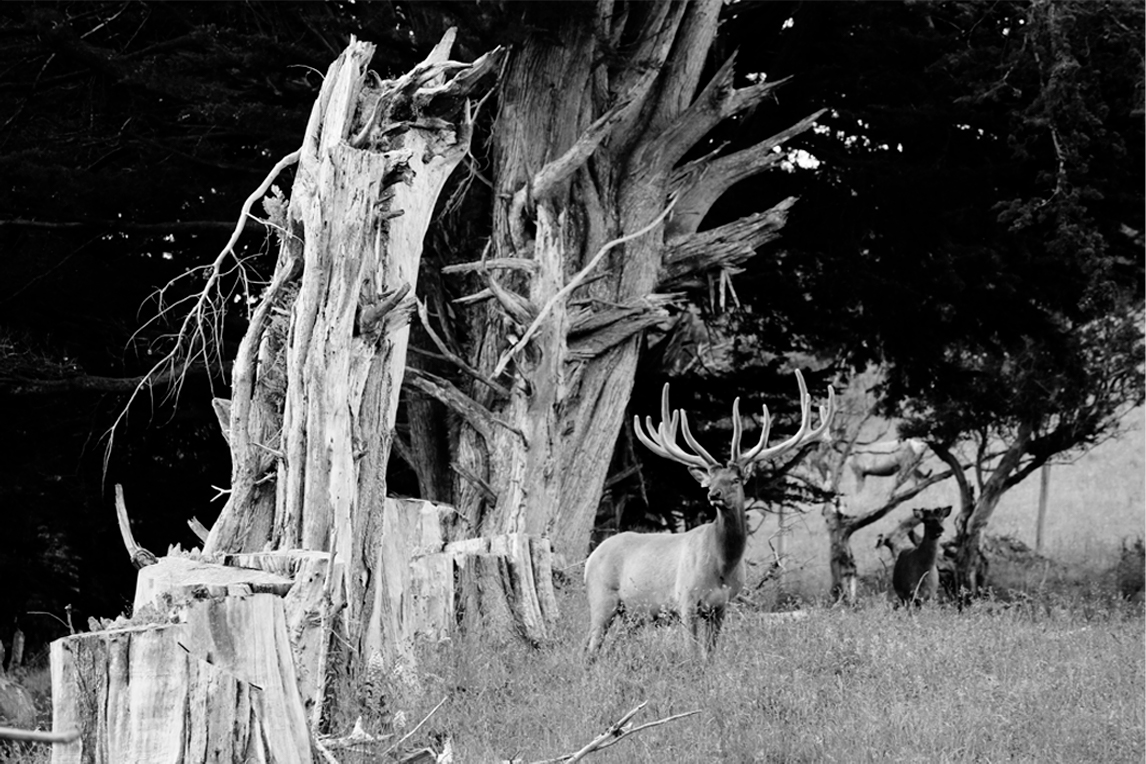Jun 21, 2024
Click a heading below or scroll down to read
Main
- A familiar face at the DINZ executive helm
- Deer voice “must not be lost” in the fresh start for climate change policy
- Economic impact of policy main concern for deer farmers
In Brief
- New DINZ board chair to be announced
- DINZ signs MoU with major Chinese TCM company
- China Business Summit: DINZ advocates for access and observes value creation
- Influencing US foodservice influencers at NRA
- Winter grazing: keeping soil and nutrients on-farm
- KPMG: Connecting farmers to their futures
- Focus on what you can control, deer farmers told
- Schroeds retires after 41 deer-filled years
- Obituary: Dr Jock Allison
- Introducing: new NZDFA chair Mark McCoard
- NZDFA Next Generation: registrations have opened
New DINZ board chair to be announced
A new chair of the DINZ board is to be announced once due process has concluded. This follows the selection of John Tacon as one of the four New Zealand Deer Farmers Association (NZDFA)’s representatives on the eight-member industry board last Thursday, replacing producer-appointed representative and current DINZ chair Mandy Bell.
The NZDFA’s selection and approval (SAP) process for its producer-appointed members outlines that candidates are afforded a 10-day challenge window to contest the selection process procedure. Out of respect for the process and the candidates, DINZ won’t comment further until the challenge window has closed and results are made official.
The NZDFA appoints four members to the deer industry board, with the other four appointed by processors/exporters.
The decision is made by the NZDFA’s eight-member selection and appointments panel (SAP), comprising the four members of the association’s national executive and four elected members. They follow a robust process set out in clause 5.3.1 (11) in the NZDFA SAP Code of Practice. This involves candidates first submitting their nomination statements to the NZDFA. They then have the opportunity to speak at the annual general meeting. About a month later, candidates are interviewed by the eight-member panel, before it considers the options and votes separately in a ballot. An independent governance advisor may be present throughout the process.
The SAP’s aim is to get the best long-term outcome for the deer industry from the three-year decision.
DINZ signs MoU with major Chinese TCM company
DINZ has signed a Memorandum of Understanding (MoU) with Beijing Tong Ren Tang Co Ltd, one of China's leading traditional Chinese medicine companies.

The MoU was signed by Chairman Gu Haiou of Beijing Tong Ren Tang (left) and DINZ interim chief executive Rhys Griffiths (right) in the presence of trade minister Todd McClay.
The signing ceremony was held in Auckland last Friday and coincided with the visit of Chinese Premier Li Qiang, highlighting the strategic importance of this partnership and the opportunities it presents for DINZ and the wider New Zealand deer industry. The MoU itself was signed in the presence of trade, agriculture and forestry minister Todd McClay.
The MoU signifies a commitment to exploring joint opportunities in research, development, and marketing of deer products, particularly velvet - known for its traditional medicinal properties. This collaboration aims to enhance market access and consumer awareness in China, leveraging Beijing Tong Ren Tang's extensive distribution network and reputation for high-quality traditional Chinese medicine.
DINZ is “thrilled to enter into this MoU with Beijing Ton Ren Tang,” says interim CEO Rhys Griffiths. “This agreement underscores the potential of New Zealand products in the global market and our shared vision for innovation and excellence.”
China Business Summit: DINZ advocates for access and observes value creation
Attending the China Business Summit in Auckland on 20 May gave DINZ executives the chance to remind officials about the importance of China market access and to see how other Kiwi wellness companies are successfully delivering more returns to New Zealand from China.
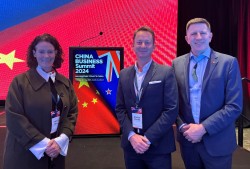
(left to right) Mandy Bell and Damon Paling caught up with NZTE’s Beijing trade commissioner Chris Metcalfe at the summit, before he headed off to the market.
It was an ideal opportunity for DINZ to actively engage in informal discussions advocating for the restoration of market access for frozen deer velvet for the upcoming 2024-2025 season, reports Paling. Among others, the trio chatted with trade and agriculture minister Todd McClay, National MP Nancy Lu, representatives from New Zealand Trade and Enterprise (NZTE), the New Zealand China Council and the New Zealand China Trade Association.
“These conversations were important in reinforcing our commitment to meeting China’s regulatory standards and underscored our dedication to maintaining strong, mutually beneficial trade partnerships,” Paling says.
They also had the opportunity to see how other leading Kiwi companies have successfully created value-added products, captured more of the value chain and delivered better returns to New Zealand. Some of the brands on show delivering premium wellbeing solutions to Chinese consumers included MitoQ, Good Health and Comvita.
More questions? Contact DINZ interim CEO Rhys Griffiths rhys.griffiths@deernz.org, phone 021-506 647 for offline discussions.
Influencing US foodservice influencers at NRA
The giant National Restaurant Association (NRA) trade show in Chicago (18-21 May) was the destination for DINZ markets manager Rhys Griffiths and assistant markets manager Virginia Connell straight after conference last month.
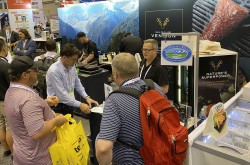
Rhys Griffiths (next to the Nature’s Superpower banner) talking to customers on the busy New Zealand venison stand in Chicago.
Foodservice is still an important market segment for farm-raised New Zealand venison in the US – although retail is the major focus of marketing activity for the next three years. The NRA trade show is a great opportunity for New Zealand venison to catch up with key influencers in that segment, explains DINZ assistant markets manager Virginia Connell.
Griffiths and Connell joined DINZ consultant chef Shannon Campbell on the DINZ-organised stand.
Campbell was front and centre cooking tasty samples and raising awareness of New Zealand venison with some of the 58,000 key trade visitors – chefs, restaurateurs, foodservice distributors and retailers – who attended the show. Ten percent more than last year, that was evidence for Connell of the rebound for US foodservice.
Six importers showed their ranges of New Zealand venison products this year, including ground venison, berry tea smoked venison and medallions. Silver Fern Farms joined TerraPacific Marketing (for Mountain River Venison), The Lamb Company (Alliance and Silver Fern Farms), Fossil Farms (First Light), and Broadleaf and Sierra Meat (both Duncan NZ).
Feedback from all was “extremely positive,” says Connell, and they were all “thrilled with the show.”
Although too early to get tangible results from the activity, she reports that interest in farm-raised venison was considerable, “ranging from taste and texture to protein content and other health benefits.”
Plant-based foods, “were less prominent at NRA than in previous years,” Connell added.
Winter grazing: keeping soil and nutrients on-farm
The benefits of keeping soil and nutrients on-farm has been Danette McKeown’s message for deer farmers attending recent winter grazing workshops in South Canterbury.
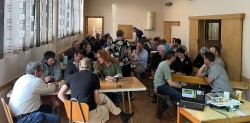 While wintering regulations are set to be repealed, the rules around identifying problem swales – also known as Critical Source Areas (CSAs) – are likely to be incorporated into farm environment plans, the environmental geologist with Lang Sustainability notes.
While wintering regulations are set to be repealed, the rules around identifying problem swales – also known as Critical Source Areas (CSAs) – are likely to be incorporated into farm environment plans, the environmental geologist with Lang Sustainability notes.
Even though rules change, “what doesn’t change are the physical features on-farm,” McKeown has been telling them, while showing the benefits of managing that risk.
“Try not to get bogged down with the rules focus on keeping soil and nutrients in the paddock,” she says.
McKeown has already facilitated four workshops this year, including a DINZ/NZDFA-supported event in Cave in April which attracted 33 deer farmers, with another in the planning stages. Her message has been finetuned over the three years she has been working with catchment groups in the region.
Around 15 South Canterbury groups, ideally numbering between 10 to 15, have now heard from McKeown and a representative from the Living Landscapes catchment collective in the independently run workshops.
The consultants’ key message has been for farmers to keep vegetation in the swales in winter crop paddocks until after the end of September, when the risk of surface runoff events lessens and new pasture/crop is likely to be getting sown.
“Good science shows the benefits of doing winter grazing well are really significant,” explains McKeown, with soil and nutrient loss potentially reduced by 80-90 percent.
Based initially on a physiographical survey of the area by Living Landscapes to identify on-farm risks and practical opportunities for management, the workshops have been supported continually by DINZ and Beef + Lamb NZ.
Groups of deer farmers in other regions interested in winter grazing workshops should contact DINZ industry capability manager John Ladley, john.ladley@deernz.org, 021 821 333.
Connecting farmers to their futures
New Zealand’s resilient farmers want their industry-good bodies, and supply chain partners to connect them to their futures, according to KPMG’s Agribusiness Agenda 2024 unveiled at Fieldays last week.
“The world is facing unprecedented volatility, which is creating significant challenges,” writes KPMG global head of agribusiness Ian Proudfoot in the annual thought-leading report, this year titled ‘Today’s potential, tomorrow’s possibilities’.
Those challenges “need to be understood and responded to if we are to keep growing food and creating value.”
Proudfoot sees “massive opportunities” in decarbonisation and bio-based economies, “which we should move towards as quickly as possible”, he thinks.
KPMG’s interviews with 150 agribusiness leaders in preparation for the report revealed their number one priority continues to be the need for world class biosecurity, followed by acting on results of gene-editing discussions, while third was signing high-quality trade agreements.
Farmers are facing “squeezed margins and a future dealing with deterioriating returns unless something changes to sustainably increase revenue or materially reduce costs,” he notes.
Diversifying farm income into new and sustainable revenue streams, through adding value to products and new markets, will be important. Reducing farm input costs will be difficult but opportunities do exist, including embedding electricity generation into the farm business, using genetic tools, and making better decisions and implementing them more effectively.
Still confident there is a “great big, beautiful tomorrow for global food systems,” Proudfoot says the disruption to food systems has accelerated, which creates “options and possibilities for participants.”
New Zealand’s resilient farmers want their industry-good and supply chain partners to work with them, “to connect them to their futures, enabling them to progressively transition from mono-product producers to inherently circular, diversified bio-economy businesses,” he says.
Focus on what you can control, deer farmers told

Jen Corkran, Rabobank. Photo: Lynda Gray.
Rabobank’s senior animal protein analyst Jen Corkran looked at the current global situation for deer products at last month’s Deer Industry Conference.
Pointing to the “uncontrollables” for farmers – China, monetary policy, geopolitics, the weather and the “Super Election” year globally – she noted the consumer is key and that “New Zealand is the perfect place to farm.”
“We need to gain value from what we already do and balance income streams,” she said. Corkran pointed to the re-balancing of venison and velvet in under 20 years from 80:20 to 50:50 today and said diversification of farm systems will also be important to manage the external risks.
She believes 2024-2025 will be “shaped by volatility”. Deer farmers need to focus on what they can control and “understand what is going on and how it may affect New Zealand,” she said.
Schroeds retires after 41 deer-filled years
Legendary deer stock agent Ron ‘Shroeds’ Schroeder retired recently after 41 years as PGG Wrightson’s deer specialist for the upper South Island.
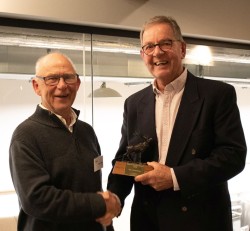
Ron Schroeder (right) being presented with the 2022 Deer Industry Award by former DINZ producer manager Tony Pearse.
Over his time in this industry, Schroeder’s contribution spread way beyond the top of the South Island. Starting as a livestock agent in 1974, after attending Lincoln University, he joined the PGG Wrightson team as a deer specialist in around 1983. Included in his many achievements over his lengthy career are: being a “matchmaker of buyers and sellers,” procuring and transacting many thousands of deer deals; being a leading advocate of deer quality assurance; and helping to procure valuable genetics from the UK and Europe.
He loves “everything about deer”, he says, and – as the citations for the 2022 Deer Industry Award he won for his outstanding contribution said – he, “always goes the extra yard for his clients” and “is a true doer”.
DINZ eNews (October 2022) reported at the time he was characteristically “gobsmacked” to be presented with the award.
DINZ thanks Schroeds for the many years spent servicing this industry and wishes him all the very best for a happy retirement. Former rugby player Luke Thompson is taking over PGGW’s upper South Island region in his stead.
Obituary: Dr Jock Allison ONZM
DINZ was very sorry to hear of the passing of Dr Arthur John (Jock) Allison on 11 May at the age of 80.

Legend: Dr Jock Allison.
Allison has been described as “a legend in his own lifetime,” by fellow AgResearch Invermay deer scientist Dr Ken Drew. Allison supported the creation of the deer research group by Drew at Invermay – from which much of this sector’s research has emanated – and ensured its continuation when he spearheaded the successful fight against the campus’ closure in the mid-2010s.
Consolidating Invermay animal research at Lincoln and Palmerston North, would have, wrote Drew, “lessened farmer accessibility to scientists and make their work geographically less relevant.”
Allison’s career was closely intertwined with the Invermay Research Centre for over 60 years, including eight as director of the campus from 1978. Over those six decades, he was recognised worldwide primarily for his major contribution to the sheep and beef industries. His own hands-on research with deer was hampered because “the first time he walked into the yards with deer, he discovered he was allergic to them,” recalls current AgResearch deer scientist Jamie Ward.
His training in reproduction research led to what is now the AgResearch Animal Genomics Team, which is now informing deer genomics work. He was a founding member of AbacusBio, an international genetics improvement company based in Dunedin, and he also held several directorships, including as director of AgResearch from 1992 to 1999.
He “measured success in both scientific publication and industry adoption,” Farmers Weekly has noted.
Allison received the NZ Society of Animal Production’s Sir Arthur Ward Medal in 2000, the same year he was made an Officer of the NZ Order of Merit for his services to agriculture. In 2003, he was also awarded the Bledisloe Medal for distinguished contribution to New Zealand’s land-based industries.
DINZ extends condolences to Allison’s wife Hilary, his two daughters and his wider family, friends and colleagues.
Read: ‘Sir Arthur Ward Award 2000, Dr A. J. (Jock) Allison’, Robin Campbell and John McEwen Proceedings of the New Zealand Society of Animal Production, 2001 61:248
Introducing: new NZDFA chair Mark McCoard
There’s a two-year window for the deer industry to attract sheep and beef farmers to this sector, reckons new NZDFA executive committee chair Mark McCoard, and he’s ready to crack into it.
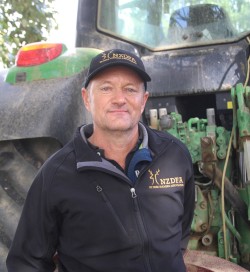
Mark McCoard. Photo: Lynda Gray.
Well-versed in NZDFA business, as an executive committee member for the past five years and chair of the association’s Taihape-Ruapehu branch for a year before that, McCoard has plenty on his to-do list.
This sector’s critical issues are: China market access negotiation for frozen velvet; ensuring there is “critical mass” of venison, which requires; attracting new deer farmers into the industry, especially into breeding and finishing; and environmental and greenhouse gas legislation, “which adds compliance costs and stress for farmers,” he says.
Farmer profitability is the driver, he says. “We’ve got to get the industry growing again and get it profitable so we can take care of important issues like the environment. We have to be ‘in the black to be green’.”
Getting deer back behind existing deer fences will be a rolling task for the association, along with putting, “our best foot forward over the next couple of years to attract sheep and beef farmers into our industry.”
A key project for the NZDFA executive committee is the continuing removal of the 85 kg carcase weight cap for young heavy stags.
“Additionally, we want to work with the venison companies, as well as DINZ markets and science teams, to support the development of new products for mature stags, for which kill numbers have tripled over the past five years,” he notes.
McCoard is pleased Duncan NZ, Mountain River Venison and First Light have done away with the 85 kg weight cap, lifting them to above 100 kg, which will, “increase farm profitability, open up more farm management options and reduce the barrier for entry for aspiring deer farmers.”
NZDFA Next Generation registrations open at the end of the month
 Registrations have opened for the NZDFA's annual two-day Next Generation conference.
Registrations have opened for the NZDFA's annual two-day Next Generation conference.
This year the conference covers breeding, finishing and velvet and will take place on 8/9 August in Palmerston North.
A mix of farm visits, presentations, a visit to Venison Packers Feilding and a dinner are included in the programme.
Spaces are limited to 50, and NZDFA branches collating expressions of interest are finding interest is running hot already.
SHORTS
- Listen: ‘Peter Allan: Figuring out how venison schedules will look for next season’, The Muster on Hokonui, 18 June 2024
- Listen: ‘Episode 22 – Exciting times ahead for the deer industry’, Countrywide Podcast talks to Ron Schroeder, Graham Brown and Rhys Griffiths, 24 May 2022.
- Read: ‘Deer Industry legend calls it a day’, Farmers Weekly, 20 May 2024
- Read: ‘Market focus for deer farmers’, Rural News, 22 May 2024
- Read: ‘Market’s message is crystal clear’, Farmers Weekly, 10 May 2024
EVENTS
Click on the bold links below to get more information about any of the events.
- Meet the Board and DINZ staff - 5:00 - 8:00pm Wednesday 17 July 2024, Fairfield House, Nelson. Register now!
- NZDFA Next Generation Conference - Thursday 8 and Friday 9 August 2024, Palmerston North, Manawatu. Spaces are limited to 50. More information: via NZDFA branch chairs and to come. Contact: louise.balkham@deernz.org
- 2024 National Velvet Competition and Awards - 5.00-11.00pm Saturday 14 December 2024, Ascot Hotel, Invercargill. Cost: TBA. Contact: Jane Campbell, southlanddeerbranch@gmail.com
- SAVE THE DATE!!! 2025 50th Anniversary Deer Industry Conference - Tuesday 13 May 2025, Queenstown. Details to follow.


